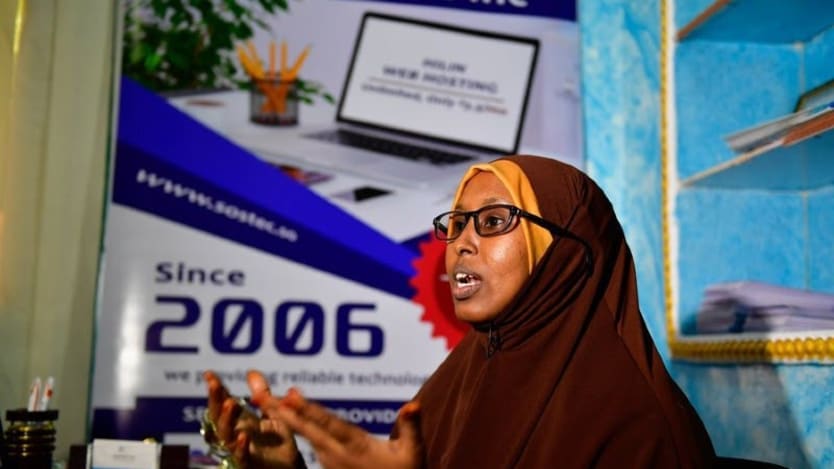
When Zahra Ibrahim began studying at a university in Mogadishu, Somalia, she was told that computer science wasn’t for women. Her parents and teachers wanted her to study medicine; being a doctor was much more acceptable for Somali girls. But she remained undeterred and is now the first female computer science lecturer at Somalia’s top university as well as the founder and CEO of SOSTEC, a software solutions provider. She is determined to empower women and close the gender gap in technology by hiring female engineers and offering courses to women on coding and design.
Podcast: Nasra Ismail on the barriers to increased female leadership
In the second episode of DevProWomen2030, a six-part audio series, Devex talks to Nasra Ismail, deputy director of the Somalia NGO Consortium, about the skills the next generation of women will need to reach executive-level positions in development.
Ibrahim is one of the many women paving the way for Somali women and girls. The country has made remarkable strides toward gender equality in recent years, considering the challenges, threats, and conflict it faces daily. At the political level, a landmark women’s charter was signed in March 2019, calling for a 50% quota across all three levels of government, for zero tolerance of gender-based violence, and for women’s rights to be enshrined in the revised constitution and the finalized electoral, security, and political laws. In 2020 and 2021, citizens will participate in the country’s first one-person-one-vote elections in decades.
We must not take this progress for granted. It has been hard won and will have a major impact on the future of the country. But more needs to be done to level the playing field and give women equal access. More focus should be given to increasing the number of women working in the formal economy. Only 19.9% of women ages 15 to 64 in Somalia are currently working. Somalia is not alone in its dismal employment statistics: Just 4 in 10 women living in fragile and conflict-affected countries have paid work, compared with 7 in 10 men.
Formal employment for women is a game changer. It alters the gendered power dynamics in patriarchal societies, gives women more agency at home and within their communities, reduces secondary poverty, and creates an environment where women’s rights are protected and valued.
There are three areas where the private sector can make a difference:
1. Bridging the skills and education gap
One of the biggest barriers to achieving gender equality in Somalia is a lack of education. Illiteracy is found among roughly 75% of females, and only around 21% of girls attend primary school. One woman leading the charge in improving education is Asha Abdulle Siyad, who is advising a national university on expanding its teacher training program for women. Not only will this provide new jobs for women, but they will serve as role models for girls wanting to complete their education.
Access to education must extend beyond the early years. Sadiyo Siad, chancellor of Hano Academy — the first accredited polytechnic academy in the country — is convinced that training and education are particularly important for women. She is offering technical and vocational education and training programs for sectors such as construction and solar energy, being creative with the types of roles she can place women in.
2. Creating a safe and secure working environment for women
Siad is not only training women for new jobs but also creating female-led cooperatives in farming and handicrafts. An often hostile and dangerous male-dominated working environment does not protect women. The private sector can provide the infrastructure to combat the harassment and discrimination that women face daily. It can build the infrastructure, such as glass windows and doors in offices, protected toilet facilities, and safe transport routes. It can eliminate the culture of hiring so that women have an equal and fair chance at finding jobs. And it can provide flexibility so that women — and men — can balance caring responsibilities with work.
3. Signing up to and implementing the Women’s Empowerment Principles
At Committed to Good’s November 2019 summit in Mogadishu, 11 of Somalia’s private sector companies publicly pledged their commitment to the Women’s Empowerment Principles set out by the U.N. The principles include establishing high-level corporate leadership for gender equality; boosting education, training, and professional development for women; and promoting equality through community initiatives and advocacy. This public acknowledgment of the need to change is the first step. We need to encourage more private sector companies to make this pledge and to chart the progress of the WEP pioneers.
Somalia is a particularly difficult environment for women to thrive in. The killing of Almaas Elman, a prominent rights activist, in Mogadishu this past November is a harsh reminder of the incredible risks women take to advance gender equality in a country that has faced near-constant conflict for decades. Women like Siad, Ibrahim, and Siyad display a determination and bravery that should not be underestimated.
Yet, against these security threats, female and male allies in Somalia’s private sector can make a real difference. They can plug the gaps in training and education, remove the barriers to formal employment, and create a more hospitable environment for women across the country. With private sector collaboration, Somalia could balance the gender scales by 2030.
Update, April 7, 2020: This article has been updated with a new link and text to clarify the female illiteracy rate in Somalia.




